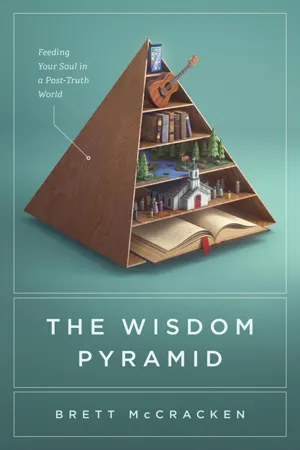Chapter 1
Information Gluttony
The exponential explosion of information in the “information age” is mind-boggling. Consider a sampling of the numbers. In 2019, a single minute on the Internet saw the transmission of 188 million emails, 18.1 million texts, and 4.5 million videos viewed on YouTube.1 By 2020, there were 40 times more bytes of data on the Internet than there are stars in the observable universe. Some estimates suggest that by 2025, 463 exabytes of data will be created each day online—the equivalent of 212,765,957 DVDs per day.2 What even is an exabyte? Well, consider this: five exabytes is equivalent to all words ever spoken by humans since the dawn of time.3 In 2025, that amount of data will be created every 15 minutes.
Here’s the craziest thing: It’s all in our pockets, just a few clicks away. Our phones are now encyclopedias. Libraries. Universities. Universes. But as convenient as it is to have such access—answers to any question we might have, results for any painting or video we want to see, umpteen resources for whatever we might want to research—the glut of information online is also overwhelming. And it is not making us wise.
Just as too much food makes a body sick, too much information makes the soul sick. Information gluttony is a real problem in the age of Google—its symptoms are widespread and concerning. Here are five of them.
Symptom 1: Anxiety and Stress
Too much of anything causes problems for our health. This is as true of the information we take in as it is of the foods we consume. The information bombardment we increasingly face—characterized by nonstop swiping, scrolling, viewing, listening, reading, texting, and multitasking from morning to night—is creating stress in our brains and contributing to rising levels of anxiety. Our brains are shockingly adaptable and resilient, but they have limits.
Today’s frenetic information landscape is making our brains busier than ever: the information triage that our over-burdened brains must constantly perform naturally drains huge amounts of energy. Constant multitasking also drains energy: making a dinner reservation on Yelp between replying to mom’s text, sending a work email, and watching a “must-see” video a friend just shared on Facebook within the span of five minutes. This sort of extreme multitasking, notes neuroscientist Daniel Levitin, overstimulates and stresses our brains:
Another way the information glut causes stress and anxiety is that we burden ourselves with massive amounts of unnecessary and often troubling knowledge. When we are physically sick, we search WebMD to find answers and usually only find more to worry about. As if our own struggles and family complexities were not emotionally burdensome enough, our Instagram and Facebook feeds pull us into the pleas, rants, and emotional vortexes of hundreds of others throughout the day. The constant news notifications of Amber Alerts, deadly tornadoes, measles outbreaks, school shootings, “suspicious activity” in our neighborhoods (thanks to apps like NextDoor), and all manner of horrific crime headlines accumulate in our consciousness, burdening our brains with anxiety about the mounting number of ways the world can kill us. Our FitBits, diet apps, and other health gadgets provide information about our bodies that can be helpful in moderation but that can easily become an anxiety-fueling obsession.
It’s not that information of this sort is always bad or unhelpful. It’s just that the cumulative effect of too much information—so easily and constantly accessible to us—creates a burden that our minds and souls were not created to bear.
Symptom 2: Disorientation and Fragmentation
The information barrage comes at us each day in disconnected, undifferentiated, all-over-the-place ways. Our social media feeds—no respecters of logical flow or the need for synthesis—embody this. Open your Facebook, Twitter, or Instagram feed now, and you’ll see this: a movie trailer next to an article about abortion; a photo from a friend’s Texas road trip followed by someone else promoting their podcast.
It naturally leaves our heads spinning and—over time—our hearts battered and ultimately numb. It’s obituaries next to baby announcements, cry-for-help laments next to “look at my best life!” vacation photos. Sports scores next to Augustine quotes. Worship music next to snake-chasing-iguana videos. John Piper sermons between sessions of Fortnite and Duolingo language learning. In the words of Arcade Fire, it’s “Everything Now!”
In addition to causing cognitive dizziness, this indistinguishable array of information erodes our ability to distinguish between the trivial and the truly important. Over time we come to value information more for its spectacle—infotainment—than for the complex realities it signifies. Our news feeds are the amusement parks, penny arcades, and vaudeville stages of the digital era.
Media critic Neil Postman saw this coming in the 1980s, when he observed that televised news had become a sort of variety show of disconnected amusements meant to keep viewers tuned in:
In addition to these numbing and desensitizing effects, the constant hum of our information feeds fragments our lives. Instead of being present with our families, we are present with the hordes demanding our attention on email, text, Voxer, WhatsApp, Messenger, and umpteen other communication platforms. Instead of being present in the places where we live, we are present in the crises across the world and the trending debates on placeless Twitter. Our feeds bring the world and all its chaos into our minds, splitting our attention in a hundred different ways.
We weren’t made for this. Writing a half centur...
